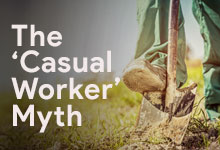
|
|
| |
|
May 2021
|
Landlord Liable for a Tragic “Freak” Flood Drowning
|
“Nature has the ability to spring a surprise when least expected” (extract from the judgment below)
A recent High Court decision dealing with the tragic drowning of a toddler highlights once again the legal dangers faced by property owners who let out accommodation to the public.
This particular case related specifically to a Holiday Let on a guest farm and a natural disaster in the form of a flood, but of course any loss however caused could lead to your visitors/guests suing you.
And weather-related disasters – think storms, floods, wildfires and the like - will almost certainly increase in both frequency and intensity if climate change predictions hold true.
A “freak” flood and a tragic drowning
- It should have been an idyllic holiday on a riverbank. A family booked a week’s vacation in one of three chalets built by a farmer on the banks of a river. The family was particularly attracted by the fact that this was the closest chalet to the river, with a wooden balcony from which the children could fish.
- The family arrived in fair weather but a violent storm and heavy rains in the river’s catchment area led to overnight flooding when the river burst its banks. They awoke at midnight to flooded rooms, struggled to escape from the chalet and were unable to save their toddler, who was swept away and drowned in the flood (according to media reports at the time, he was torn from his father’s arms whilst his father and an older brother clung to a tree in the raging flood).
- The family sued the farmer as owner of the farm, chalet and guest house business. They also claimed against his wife, but this part of the claim failed as she was married to the farmer out of community of property, and had merely assisted him with bookings and administration.
- As regards the farmer as property owner, although he denied any element of “wrongfulness” (unlawfulness), the Court found that he had built the chalets in a dangerous area, known to experience occasional flooding, and therefore had a legal duty to ensure that they were safe for use by members of the public.
- The owner also denied any negligence. The flood, he said, was a “freak of nature” and not foreseeable, no such event having been experienced for over 40 years. He had built the chalet 6m above the normal river level and 2.8m over the high water mark pointed out to him by the previous owner.
- Expert evidence was that the year in question had seen a normal rainfall pattern and that the day in question experienced “high but not abnormal” rainfall. The chalet was built in the “dangerous area” of a 100-year flood line area with no escape route nor flood warning mechanism. Such floods, the expert said, could be expected once every 17-18 years.
- Critically, the Court found on the evidence that the possibility of heavy flooding was “foreseeable” and that the owner’s failure to take steps to protect chalet occupants rendered him liable.
- The owner also argued that the family had no right to sue because of disclaimer notices which he said were at the farm entrance warning visitors that they entered at their own risk. He also claimed to have taken reasonable steps to warn occupants of the danger of flooding. On its assessment of conflicting evidence however the Court found that even if there were warning and indemnity notices as claimed, the owner had not proved that they were brought to the family’s attention. In any event, said the Court, it would in this case be unjust and unfair to deny the family its claim.
- The owner is accordingly liable for whatever damages the family can prove.
Property owners – protect yourself!
- From a practical point of view you will want to pro-actively investigate any potential risks, manage them, warn your guests/tenants about them and make sure they know how to protect themselves should Mother Nature suddenly spring one of her nasty surprises.
- The legal side to all that of course is that you should always be able to show that you have taken reasonable steps to protect your guests from all foreseeable risks.
- Comply also with all building and safety regulations – not doing so immediately puts you in the wrong.
- Take advice on the use of indemnity/disclaimer/exemption notices on your website, all advertising materials, booking platforms etc, also on the premises themselves and in your contracts. Bear in mind that there are limits to their effectiveness particularly where the Consumer Protection Act or constitutional considerations apply.
- Insurance – make sure you are covered for any claims of this nature, and that you comply fully with any requirements imposed on you by the insurers.
Most important of all, take professional advice specific to your circumstances!
|
|
Employers: Beware the “Casual Worker” Myth!
|
Employees in South Africa enjoy strong protections under a raft of laws such as the Basic Conditions of Employment Act (BCEA), the Labour Relations Act (LRA) and the Employment Equity Act (EEA).
Failure to comply with these Acts, whilst perhaps tempting to many employers struggling financially in these hard times, is not only unfair to employees (many of whom are in equally dire straits), but also an extremely risky business from a legal perspective. The CCMA (Commission for Conciliation, Mediation and Arbitration) and our courts take a dim view of employers flouting these laws, and offenders will pay heavily for doing so.
So, what is a “casual worker”?
A commonly held and dangerous myth is that you don’t have to worry about these laws when employing “casual workers”. That is perhaps a hangover from the pre-1997 definition of “casual labourers” as those who worked for 3 days or less per week.
However, that definition fell away with amendments to the BCEA in 1997, since when we have had no defined concept of “casual worker” or “casual employee”. What counts now is that employees who work for you for less than 24 hours per month are excluded from core BCEA protections - those relating to contracts, hours of work, overtime pay, leave, sick leave, termination and so on (the prohibitions against employment of children and forced labour still apply).
There is nothing to stop you using terms like “casual employee” or “casual worker” but bear in mind that they have no legal effect – what counts is that anyone working for you for 24 hours or more per month, no matter how you refer to them, falls under the BCEA’s provisions.
What about independent contractors and excluded employees?
Turning now to anyone working for you for more than 24 hours per month (outside the strict ambit of this article perhaps but relevant for context and comparison) –
- The BCEA’s protections are limited in the cases of certain employees, such as those earning over a specified threshold, senior management, some sales staff, employees of smaller businesses, specific employees like National Defence Force members and so on, with Ministerial “sectoral determinations” also applying in some sectors.
- “Independent contractors” have no employee protections (they are explicitly excluded from the definitions of “employee” in the BCEA, the LRA and the EEA), with the vital qualification that they must genuinely be non-employees. As far as labour law considerations are concerned, there are presumptions to overcome, criteria to consider and requirements to meet, and you cannot get away with disguising an employer/employee relationship as an employer/contractor one (no matter what your contract says). A related but separate issue is that SARS will hold you liable to withhold PAYE unless the relationship meets its own specified criteria. This is a complex subject on its own, with many grey areas and pitfalls, so specific professional advice is essential in any doubt.
|
|
Companies: Are Restraints of Trade Valid in a Time of Covid?
|
“For him to be forced out of a career of choice to start working in a different field at a time when many businesses are closing down, retrenchments and lay-offs being commonplace and individuals doing everything possible to survive and cope with the health and economic devastating effects of the covid 19 pandemic, is plainly unreasonable and contrary to public policy and constitutional values” (extract from judgment below)
Consider this unhappy (but not unlikely) scenario: For whatever reason, you part ways with your fellow director/shareholder (or perhaps a key employee), who goes off immediately to join (or found) the opposition.
Now you have a major problem – he/she was privy to all your trade secrets and confidential information and they are now being used to compete against you. Your business could be crippled.
Using the time-tested restraint of trade clause
An effective and time-tested way of protecting your business from such a risk is to insist on all directors, shareholders and key employees signing restraint of trade agreements from the start. Such restraints are usually included as clauses in employment contracts and/or (less commonly) in shareholder agreements.
However, it is vital to word the restraint clause correctly if it is to stand up to legal scrutiny. Although our law has long recognised the right of businesses to enforce this type of contract so as to protect their “proprietary and protectable interests”, and although in general we are held by the law to the agreements that we conclude, there is always a balance struck with the employee’s constitutional rights to be economically active and to earn a living.
As the High Court put it recently: “It is settled law that restraints of trade are valid and binding and, as a matter of principle, enforceable unless, and to the extent that, they are contrary to public policy because they impose an unreasonable restriction on the former employee’s freedom to trade or to work. It is also settled that the onus of establishing that the restraint of trade is unreasonable falls on the former employee.”
A common mistake – going “too wide”
The most common mistake businesses make is to word the restraint of trade too widely (in one or more of type of activity, geographical area or time period). No matter how tempting it may be to do so, that is courting disaster. The wider the clause is, the greater the chances of a court holding it either totally invalid or only partially enforceable. Rather word your clauses tightly and defensibly.
Two recent High Court decisions illustrate both this principle, and the potential impact of the Covid-19 pandemic on our courts’ approach to the questions of reasonableness and time periods.
The impact of the pandemic on the “reasonableness” test
- A director, shareholder and employee of a company specialising in media and advertising solutions resigned as both director and employee after a breakdown in relations, the company owing him R1.2m in short-paid salary. He however retained his shareholding.
- He was subject to restraints of trade (in both his employment and shareholder agreements) which prohibited him from working for a competitor, and from sharing confidential information and trade secrets with them, for 18 months in any of 29 African countries.
- He nevertheless joined a direct competitor (active in 2 of the 29 African countries) and acted in breach of the restraint by contacting customers and business associates. When sued in the High Court for enforcement of the restraint clauses, his main defence was that they were unreasonable and prevented him from earning a living.
- The Court confirmed the need to consider all the relevant circumstances, not only at the time a restraint is entered into, but also at the time that the business tries to enforce its restraint. In this case, the company’s attempts at enforcement encompassed the period March to July 2020 – a time of strict lockdowns and economic turmoil.
- The upshot – the Court rejected the company’s suggestion that the ex-director could remain economically active in another field for which he was qualified, commenting: “For him to be forced out of a career of choice to start working in a different field at a time when many businesses are closing down, retrenchments and lay-offs being commonplace and individual[s] doing everything possible to survive and cope with the health and economic devastating effects of the Covid-19 pandemic, is plainly unreasonable and contrary to public policy and constitutional values”. The restraints were rejected as unenforceable.
The impact of the pandemic on time periods
Another recent High Court decision saw the Court reducing a 2-year restraint, on sales employees who resigned in March and April 2020 respectively, to 14 months.
In doing so the Court took what it considered to be a reasonable base period in the circumstances of 12 months and added 2 months “to compensate for the lockdown period”, also commenting that “…I am aware that our society is living in strange times. The COVID-19 pandemic has played havoc with, inter alia, our economy. Businesses have been prevented from operating and the ability of the applicants to appoint and train new salespersons will undoubtedly have been blunted by the state of the economy. This is of some relevance when considering the length of the period of restraint…”.
So - are restraints of trade valid in times of pandemic and upheaval?
Neither decision means that restraints are necessarily unenforceable or only partially enforceable during times of economic turmoil and high unemployment. Each case will be decided on its own merits, but in assessing whether your own restraint clauses will be considered reasonable and enforceable, they are clearly factors to be borne in mind.
|
|
Extended: The Rights of Grieving Parents to Choose Burial After Pregnancy Loss
|
Expectant parents who lose a pregnancy before 26 weeks (the age set by the Births and Deaths Registration Act (BADRA) in its definition of “still-born”) have until now had no right to bury their foetus, which had to be incinerated as “medical waste”.
That has changed with a recent High Court order declaring the relevant provisions of BADRA unconstitutional. That order is suspended to give Parliament an opportunity to amend BADRA, plus it must also go to the Constitutional Court for confirmation. But in the interim the Court has allowed burial (via the issue of a “stillbirth certificate” or “declaration of stillbirth”) on request by the bereaved parent or parents.
The Court declined to extend this new choice to foetal deaths resulting from human intervention (“voluntary induced termination”) so for now at least this new freedom to choose is available only to grieving parents in the case of natural deaths (miscarriages).
|
|
Your Website of the Month: Protecting Yourself and Your Business in Flu Season 2021
|
Flu season is upon us again, and it is not to be underestimated with between 7,000 and 12,000 flu-related deaths historically reported in South Africa every season. Whether or not this year’s lockdown precautions will reduce infection levels to the same extent that they did last year, take the time to make sure that you, your family and (if you are in business) your colleagues and employees are prepared.
Go to Medical News Now for “Evidence-based resources to help keep you and your loved ones healthy during the 2020–21 flu season” on its Flu page (its “Flu v Covid-19” section is particularly informative).
Be aware that there could be a run on the flu vaccine with articles like “Flu shots linked to fewer severe Covid-19 cases - US study” on News24 doing the rounds.
|
|
Note: Copyright in this publication and its contents vests in DotNews - see copyright notice below.
|
| |
 |
 |
|
|










